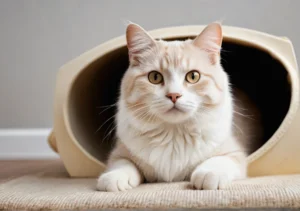Cats are known for their mysterious and elusive behavior. One common question among cat owners is: why does a cat avoid littering? Let’s explore the reasons behind this curious feline behavior.
Feline Hygiene Instincts
Cats are notorious for their meticulous grooming habits, spending hours each day cleaning themselves. This behavior stems from their ingrained hygiene instincts, as cats in the wild rely on staying clean to avoid predators detecting them by scent. So, when it comes to using the litter box, cats have a strong aversion to soiling their living spaces. They instinctively seek out a clean area to do their business, much like how they meticulously clean themselves to remove any odors that could give away their presence to potential threats.
This instinctual drive for cleanliness also extends to their litter box preferences. Cats have a natural preference for sandy or fine-grained substrates, similar to the texture of soil in the wild. Providing a litter box with a substrate that mimics this texture can satisfy their instinctual need for cleanliness and encourage them to use it consistently. By understanding and accommodating their hygiene instincts, you can create a comfortable and inviting environment for your cat to do their business.
Territorial Nature
In addition to their hygiene instincts, a cat’s territorial nature plays a significant role in their behavior around littering. Cats are highly territorial animals, marking their territory with urine and feces to establish boundaries and communicate with other cats. This territorial instinct can influence where a cat chooses to eliminate, as they may avoid certain areas where they do not feel secure or in control.
To prevent litter box aversion due to territorial issues, it’s essential to provide multiple litter boxes in different locations throughout your home. This allows your cat to assert their territory without feeling threatened or vulnerable. Each cat in the household should have their own designated space to eliminate to reduce competition and potential conflicts over the litter box. By understanding and respecting your cat’s territorial instincts, you can create a harmonious environment that promotes consistent litter box use.
Extra Tip : Keep litter boxes clean: Cats have a keen sense of smell and are more likely to avoid a dirty litter box. Regular scooping and weekly cleaning are essential to ensuring your cat’s comfort and hygiene needs are met.
Scent Sensitivity
Cats have a heightened sense of smell compared to humans, making them more sensitive to odors. This sensitivity can play a significant role in their reluctance to litter in certain locations. If a litter box is placed near strong-smelling substances like cleaning agents, detergents, or even certain foods, the cat may avoid using it altogether.
Additionally, cats are known to prefer unscented litter, as artificial fragrances can be overwhelming to their delicate noses. Therefore, it’s crucial to place the litter box in a well-ventilated area away from strong scents to ensure your cat feels comfortable using it. Pay attention to the scents in your home that may deter your cat from using the litter box and make adjustments accordingly.
Unique Insight:
Consider using natural, unscented litter options like paper-based or pine litter, which are gentle on your cat’s sensitive nose and less likely to cause aversion due to strong artificial scents.
Preference for Cleanliness
Cats are naturally clean animals that spend a significant amount of time grooming themselves. This innate preference for cleanliness extends to their living spaces as well. Cats prefer to have a tidy and clean environment, which includes their litter box.
If the litter box is not cleaned regularly or if it becomes too soiled, cats may avoid using it altogether. It’s essential to scoop the litter box daily, change the litter regularly, and clean the box with mild, unscented soap to maintain a hygienic environment that your cat will feel comfortable using.
In addition to cleanliness, the location of the litter box plays a crucial role in a cat’s willingness to use it. Cats prefer privacy when using the litter box, so it’s best to place it in a quiet, secluded area away from high-traffic areas and loud noises.
For an additional resource on cat littering preferences, check out this article from the American Veterinary Medical Association: AVMA Cat Litter Box Guidelines.
Negative Associations
Cats may avoid littering due to negative associations with their litter box. If a cat has experienced discomfort, pain, or even fear while using a particular litter box, they may be reluctant to use it again. Unpleasant odors, insufficient cleanliness, or a cramped space can also deter a cat from using their litter box. It’s important to ensure the litter box is kept clean, spacious, and in a quiet, accessible location to prevent these negative associations from developing.
Behavioral Conditioning
A cat’s past experiences and interactions with their environment can heavily influence their littering habits. For example, if a cat was punished or startled while using the litter box, they may associate the litter box with negative experiences and avoid it in the future. Conversely, if a cat had positive experiences with a particular litter box, they are likely to continue using it. Additionally, changes in the environment, such as moving the litter box or introducing a new type of litter, can also impact a cat’s littering behavior. It’s essential to observe your cat’s behavior and make adjustments to create a comfortable and familiar littering environment for them.
Tips for Creating a Positive Littering Environment for Your Cat: 1. Ensure the litter box is clean and odor-free. 2. Place the litter box in a quiet, accessible location. 3. Use a litter that your cat prefers. 4. Provide multiple litter boxes in multi-cat households. 5. Monitor your cat’s behavior and make adjustments as needed to promote positive littering habits.
Environmental Factors
Cats can be quite picky when it comes to their litter habits. The location of the litter box plays a significant role in whether your feline friend will use it or not. Make sure it’s in a quiet, private area, away from loud noises or high foot traffic. Additionally, the type of litter used can also impact your cat’s willingness to use the box. Experiment with different textures and scents to see what your cat prefers. Lastly, keeping the litter box clean is crucial. Cats are meticulous creatures and may avoid a dirty box. Make sure to scoop daily and change the litter regularly to maintain a pleasant environment for your cat.
Interesting Fact: Cats are meticulous groomers, spending up to 50% of their waking hours cleaning themselves.
Cats are famous for their grooming habits, but did you know that they devote a significant amount of time to this activity? Grooming is not just about looking clean; it’s also a way for cats to maintain their scent and mark their territory. By keeping themselves clean, cats are able to communicate with other cats and feel comfortable in their environment. This behavior translates to their littering habits as well. Cats prefer clean spaces, so ensuring a clean litter box can encourage proper littering behavior in your feline friend.
Myth Busting: Address common misconceptions about why cats avoid littering and provide accurate information to dispel myths.
Cats can be picky creatures, and when it comes to their bathroom habits, there are plenty of myths floating around. One common misconception is that cats avoid littering because they are trying to be stubborn or difficult. In reality, there are a variety of reasons why a cat may avoid their litter box.
One key factor that could be causing your cat to avoid littering is the cleanliness of their litter box. Cats are naturally clean animals and may be deterred from using a dirty or smelly litter box. Make sure to scoop out the litter box daily and change the litter regularly to keep it fresh.
Another myth is that cats avoid littering as a form of revenge. This is simply not true. Cats may avoid their litter box if they are experiencing health issues such as urinary tract infections or blockages. It’s important to monitor your cat’s litter box habits and consult with a vet if you notice any changes.
Ultimately, understanding your cat’s needs and preferences is key to preventing litter box avoidance. By providing a clean and comfortable environment, you can help ensure that your feline friend feels comfortable using their litter box.
And remember, patience is key when addressing litter box issues. With time, attention, and a little troubleshooting, you can help your cat get back on track with their litter box habits.
Additional Unique Insight:
- Introducing multiple litter boxes in different areas of the house can help cater to your cat’s preferences for privacy and accessibility. Some cats may prefer a quiet, secluded spot for their bathroom needs, so offering multiple options can increase the chances of them using their litter boxes consistently.
Alex, a passionate animal lover, has experience in training and understanding animal behavior. As a proud pet parent to two dogs and three cats, he founded AnimalReport.net to share insights from animal experts and expand his knowledge of the animal kingdom.




